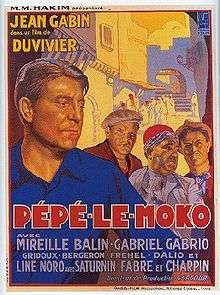Pépé le Moko
Pépé le Moko [pe.pe lə mo.ko] is a 1937 French film directed by Julien Duvivier and starring Jean Gabin. The plot involves the trapping of a gangster on the run in Algiers, who believes he is safe from arrest in the Casbah. It was considered experimental for its day, and is credited with having inspired The Third Man.
| Pépé le Moko | |
|---|---|
 Theatrical release poster | |
| Directed by | Julien Duvivier |
| Produced by | Raymond Hakim Robert Hakim |
| Screenplay by | Julien Duvivier Henri La Barthe Jacques Constant (adaptation) Henri Jeanson (dialogue) |
| Based on | Pépé le Moko by Henri La Barthe |
| Starring | Jean Gabin |
| Music by | Vincent Scotto Mohamed Ygerbuchen |
| Cinematography | Marc Fossard Jules Kruger |
| Edited by | Marguerite Beaugé |
| Distributed by | Arthur Mayer and Joseph Burstyn (USA, 1941) The Criterion Collection (Region 1 DVD, 2004) |
Release date |
|
Running time | 94 minutes |
| Country | France |
| Language | French |
Background
The film depicts a gangster nicknamed Pépé le Moko. Moko is slang for a man from Toulon, derived from the Occitan amb aquò ("with that"), a term which punctuates sentences in Provence and which, in Toulon, is pronounced em'oquò.
The film is based on Henri La Barthe's novel of the same name, and La Barthe contributed to the screenplay under the pseudonym Détective Ashelbé. The sets were designed by the art director Jacques Krauss.
Pépé le Moko is an example of the 1930s French movement known as poetic realism, which combines realism with occasional flashes of unusual cinematic tricks. It often is considered a predecessor of film noir.
Plot
Pépé le Moko (Jean Gabin), a criminal on the run from the police in metropolitan France, lives in the Casbah quarter of Algiers with his gang, where he is out of reach of the local police. Inspector Slimane (Lucas Gridoux) seeks a way to lure Pépé out of his refuge. He sees his chance when he learns that Pépé is in love with Gaby (Mireille Balin), the mistress of a rich businessman. Slimane leads Gaby to believe that Pépé has been killed. Gaby, who was on the point of joining him in his hiding place, now agrees to stay with her rich lover. When Pépé is informed that Gaby is about to leave Algiers for good, then he leaves the Casbah to find her and is arrested.
Cast
- Jean Gabin as Pépé le Moko
- Gabriel Gabrio as Carlos
- Mireille Balin as Gaby Gould, the beautiful Parisienne
- Saturnin Fabre as Le Grand Père
- Fernand Charpin as Régis
- Lucas Gridoux as Inspecteur Slimane
- Gilbert Gil as Pierrot
- Marcel Dalio as L'Arbi
- Charles Granval as Maxime
- Gaston Modot as Jimmy
- René Bergeron as Inspecteur Meunier
- Paul Escoffier as Chief Inspecteur Louvain
- Roger Legris as Max
- Jean Témerson as Gravèr
- Robert Ozanne as Gendron
- Philippe Richard as Janvier
- Georges Péclet as Barsac
- Line Noro as Inès
- Fréhel as Tania
- Olga Lord as Aïcha
- Renée Carl as La mère Tarte
Critical reception
Rotten Tomatoes reports an approval rating of 100% based on 31 reviews, with an average rating of 8.65/10.[1] Metacritic reports a score of 98, based on 12 reviews, indicating "universal acclaim".[2]
English author Graham Greene in a review of the film for The Spectator asserted: "One of the most exciting and moving films I can remember seeing". It succeeds in "raising the thriller to a poetic level".[3] According to a BBC documentary, it served as inspiration for Greene's screenplay for The Third Man. It has many similarities with the American film Casablanca, which was released a few years later.
Remakes
The film was remade in America in 1938 as Algiers, starring Hedy Lamarr and Charles Boyer, and again in 1948 as Casbah, a musical starring Tony Martin, Märta Torén, Yvonne de Carlo, and Peter Lorre.
References
- "Pépé le Moko (1937)". Rotten Tomatoes. Fandango Media. Retrieved August 10, 2019.
- "Pépé le Moko (re-release)". Metacritic. CBS Interactive. Retrieved August 10, 2019.
- Greene, Graham (22 April 1937). "Stage and Screen: The Cinema". The Spectator. Retrieved 7 June 2016.
External links
- Pépé le Moko on IMDb
- Pépé le Moko at Rotten Tomatoes
- Pépé le Moko at Metacritic
- Pépé le Moko at AllMovie
- Pépé le Moko an essay by Michael Atkinson at the Criterion Collection